Simple Ayurvedic Secrets to Calm Asthma Naturally

Inhaling. Something that most people don’t even consider. However, for an asthmatic, every breath is a struggle with a constricted chest, an unrelenting wheeze, and a sense of impending death with every second that goes by without air being drawn in. Every person with asthma receives treatment using contemporary, rapid relief techniques. Inhalers and steroids are fantastic. But what if, in addition to providing relief, there was a gentle method that not only eliminated the symptoms but also fortified the body and soothed the mind for a long time?
India’s 5,000-year-old traditional system of natural healing, Ayurveda, can help with that. Ayurveda, which is based on prevention and balance, views asthma as a lung condition that also represents a more basic imbalance in the body’s immunity, digestion, and energy. What about its treatments? Frequently straightforward, organic, and highly efficient.
Ayurvedic Foods for Relief from Asthma

Ayurveda incorporates diet since it affects dosha balance and general health. Foods that are light, digestible, and warming are essential for people with asthma. This would calm Vata and lessen Kapha. The following are some dietary recommendations and foods to eat:
1. Warm, Cooked Foods
Raw, heavy, or cold foods raise mucus and Kapha. Select light-digesting, warm, cooked foods. Excellent choices include soups, stews, and porridges prepared with light grains like barley, millet, or quinoa. The body is nourished by these foods without the respiratory system becoming obstructed.
2. Anti-Inflammatory Spices
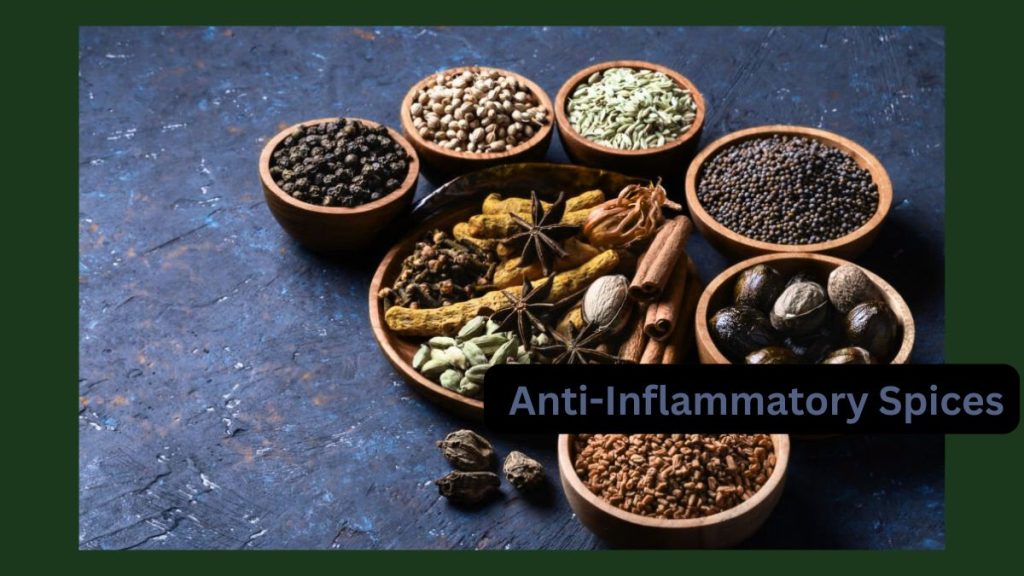
Spices are an important component of Ayurvedic cooking and are well known for their medicinal value. Use the spices below to decongest and open up airways:
Turmeric: It contains curcumin, a powerful anti-inflammatory compound that inhibits airway inflammation. Mix a small quantity of turmeric in soups, teas, or warm milk.
Ginger: This warmth helps digestion and loosens mucus from the lungs. Sip ginger tea or suck on raw ginger with honey.
Cinnamon: It helps circulation and soothes congestion of Kapha. Sprinkle cinnamon on oatmeal or put it in herbal teas.
Black pepper: It improves respiratory airway clearance and digestion. Combine with honey to create a warming cure.
3. Honey :
In Ayurveda, honey is considered a powerful lung tonic. It helps thin mucus, making it easier to expel, and soothes the throat. Try this simple remedy:
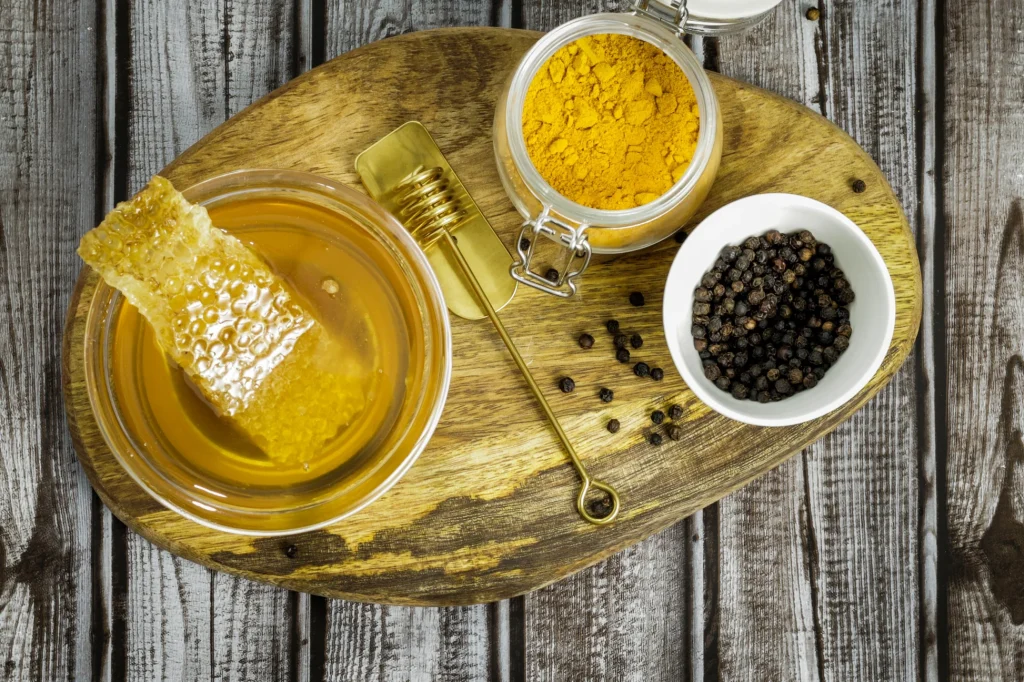
Mix 1 teaspoon of raw honey with a pinch of black pepper and turmeric. Take it twice daily to support clearer breathing.
4. Leafy Greens and Vegetables :
Vegetables that are light, bitter, and astringent help to cleanse the body and lower Kapha. Consume vegetables such as broccoli, kale, spinach, and zucchini. Steer clear of starchy, heavy vegetables like potatoes as they promote the production of mucus.
5. Fruits
Pick warm, easily digested fruits like pomegranates, cooked apples, and pears. Steer clear of cold, heavy fruits that can aggravate Kapha and cause congestion, such as melons and bananas.
6. Healthy Fats
Sesame oil and ghee (clarified butter) are good sources of healthy fat that balance Vata and support the lungs. In Ayurveda, ghee is generally thought to promote digestion and heal tissues. Ghee can be used to cook with or as a garnish for hot food.
Herbal Teas for Daily Relief

Instead of reaching for another cup of coffee, brew yourself a lung-friendly tea:
- Ginger Tea: Fresh ginger slices boiled in water with a squeeze of lemon.
- Cinnamon + Clove Tea: Helps warm the body, fight congestion, and improve circulation.
- Trikatu Tea: A classic Ayurvedic blend of ginger, black pepper, and long pepper — great for breaking down stubborn mucus.
Foods to Avoid

- Foods that aggravate Kapha or produce ama (toxins) should be avoided in order to manage asthma:
- Cold or chilled food and beverages
- Dairy products (apart from tiny amounts of ghee)
- Fried, processed, or greasy foods
- Sweet foods and refined carbs
- Heavy meats and seafood
Ayurvedic Herbal Remedies for Asthma
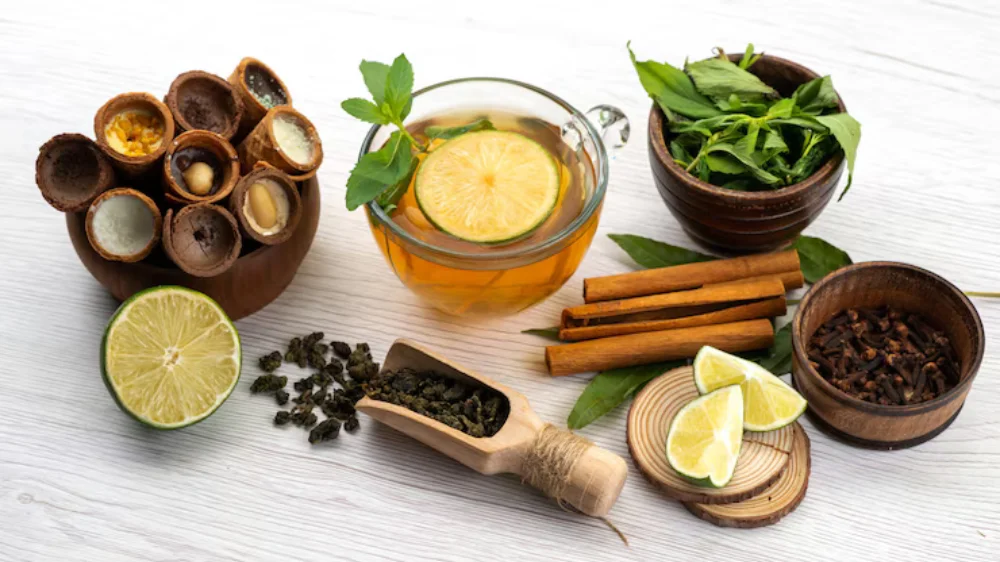
Always consult an Ayurvedic practitioner or healthcare professional before starting herbal remedies, especially if you’re on medication. Here are some commonly used herbs:
1. Holy basil or tulsi
Because of its immune-supporting effects and ability to clean the respiratory tract, tulsi is considered a sacred medicinal plant in Ayurveda. Tulsi has an antimicrobial and anti-inflammatory effect and protects against many bacterial and viral infections that may trigger asthma symptoms. For making tulsi tea, soak small or large quantities of dried or fresh tulsi leaves in boiling water for 10 minutes. One or two cups are then drunk everyday.
2. Yashtimadhu, or Licorice Root
For inflammatory and irritated airways, licorice root is great indeed. Wheezing and coughing are reduced because of its sweet and soothing properties that also calm the throat and lungs. To have a cup of licorice tea, steep a small piece of licorice root in boiled water and drink it. Though, use it with caution as prolonged use of licorice could lead to unwanted side-effects in some users.
3. Long pepper or pippali
Pippali is regarded as warm, desiccates mucus, and tones the lungs. For maximum effectiveness, it is typically combined with honey or ginger. Under the supervision of the practitioner, small dosages of powder or capsules are to be taken.
4. Churna Sitopaladi
Using ingredients like bamboo manna, pippali, cardamom, and cinnamon, this incredibly traditional Ayurvedic medicine recipe treats respiratory conditions. It thins phlegm, soothes the throat, and stops coughing. It should be taken in small doses with honey once or twice a day.
5. Adhatoda vasica, or Vasaka
Vasaka has anti-inflammatory and expectorant properties, making it a potent herb for respiratory health. It makes breathing easier by clearing mucus and opening up airways. Vasaka can be consumed as a supplement or as a tea.
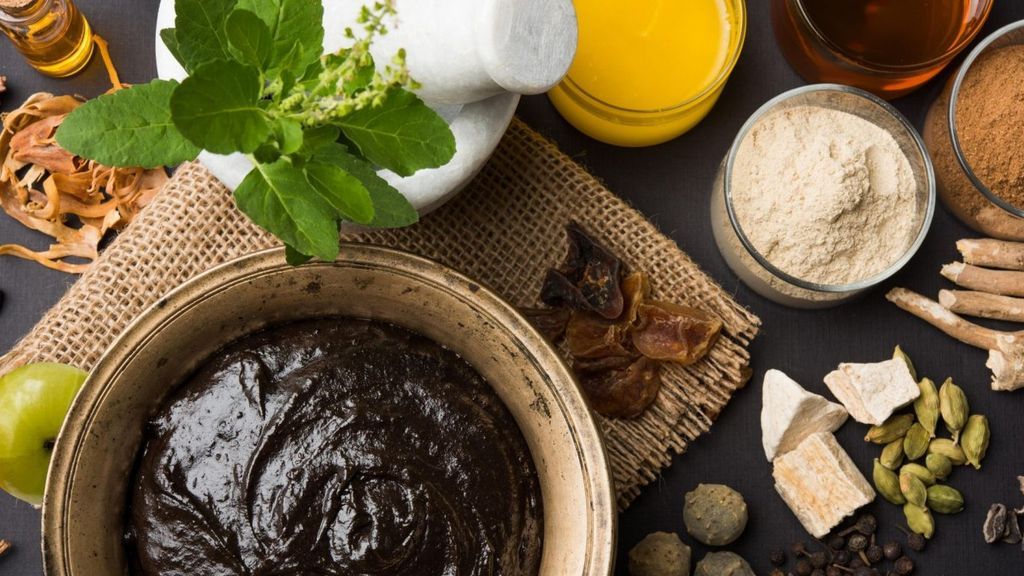
Many Ayurvedic formulations combine these herbs. One of the most famous is Chyawanprash, a rejuvenating herbal jam rich in amla (Indian gooseberry) and over 40 other herbs. Taken daily, it strengthens the lungs and immunity.
3. Lifestyle Practices
Asthma isn’t only about the lungs — it’s about the whole system. Ayurveda emphasizes daily practices that strengthen the body and calm the mind.

- Pranayama (Breathwork): Gentle practices like Anulom Vilom (alternate nostril breathing) and Bhramari (humming bee breath) improve lung capacity and reduce anxiety during flare-ups.
- Yoga Asanas: Poses like Bhujangasana (Cobra Pose), Setu Bandhasana (Bridge Pose), and Matsyasana (Fish Pose) expand the chest and improve airflow.
- Abhyanga (Oil Massage): Daily self-massage with warm sesame oil can reduce stress, improve circulation, and support overall immunity.
- Sleep & Stress Management: Restful sleep and relaxation techniques like meditation help calm Vata, which plays a big role in triggering attacks.
Sample Daily Routine for Asthma Recovery
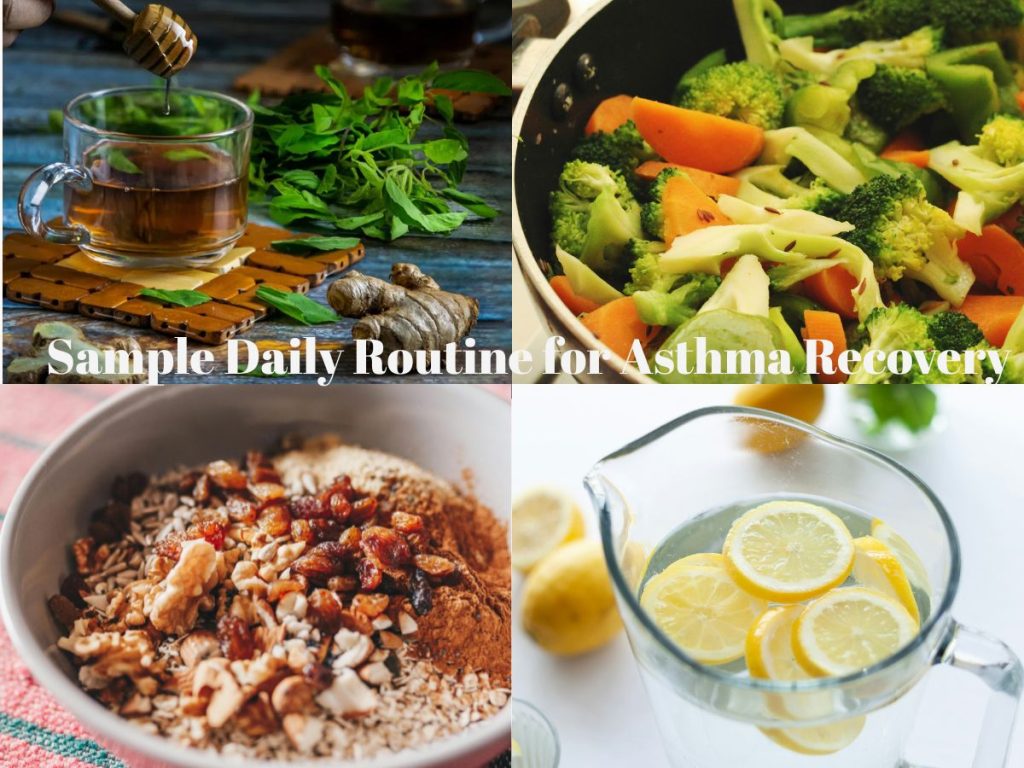
The routine example that follows will help you apply Ayurvedic principles to your daily life:
Early in the morning: To start digestion, gargle with warm water or drink warm water with lemon juice. Spend five to ten minutes practicing pranayama. Breakfast is a warm bowl of oatmeal with a small amount of ghee and cinnamon.
Mid-morning: Ginger or tulsi tea with honey. Lunch is quinoa and turmeric-based light vegetable soup. Afternoon: To increase circulation, take a quick stroll or practice mild yoga.
Evening: Millet and mildly steamed veggies for supper. If required, double with steam inhalation. Night: Before going to bed, apply Nasya oil, and then relax with meditation.
Breathing Free Again

Ayurveda not only offers symptomatic relief from asthma, but the possibility of a more vigorous, healthier existence using herbs, mindful breathing, nutritious food, and self-care ceremonies.
So, if you’ve been searching for a way to breathe more freely — not just in your lungs but in your whole being — maybe it’s time to give Ayurveda a try.
Your breath is your breath. And you have the right to feel it come, effortless and regular, each day of your life.
